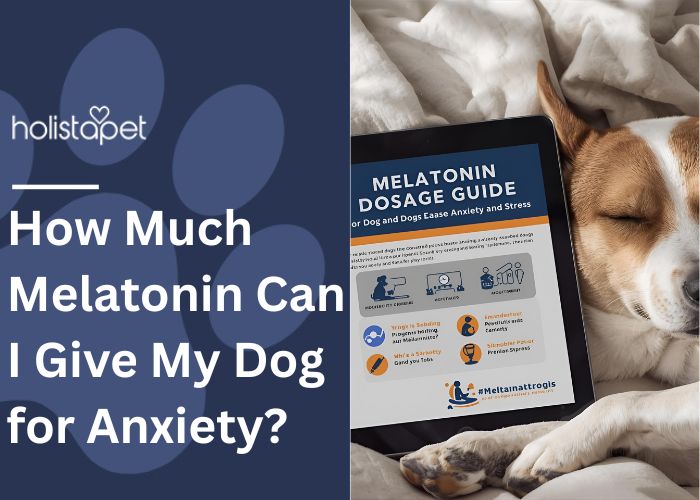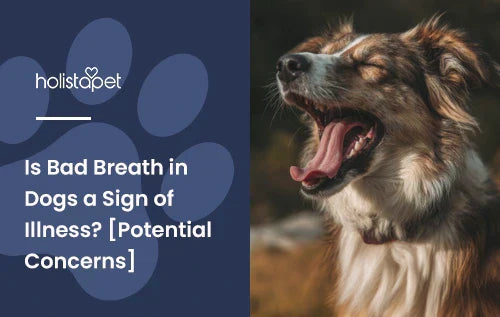“How much melatonin can I give my dog for anxiety?” This question often comes from owners of nervous or skittish pups. The truth is, many dogs suffer from worry during fireworks, car rides, vet visits, or bedtime restlessness, and melatonin often gets recommended as a natural way to help.
This soothing remedy works by supporting sleep-wake cycles and calming anxious behaviors. With the right guidance on dosage and timing, owners can feel confident about giving melatonin to help calm their furry companions.
What Is Melatonin and How Does It Work in Dogs?

Melatonin is a naturally occurring hormone made in the pineal gland in the brain that helps control sleep-wake cycles. It works with circadian rhythms to guide rest and relaxation.
Dog owners often try melatonin products when their pups struggle with restlessness, pacing, nervousness, or loud noises. This gentle solution signals the body that it's time to settle down. Vets may also suggest melatonin supplements for sleep disorders, anxious behaviors, or even seasonal flank alopecia. With the right dosage, most pets show calmer moods and more regular sleep patterns.
Why Pet Parents Use Melatonin for Dog Anxiety
Melatonin often helps calm dogs during stressful events, making it a go-to for many pet parents. This natural option can help soothe anxious behaviors and bring comfort during tough moments.
-
Stressful Situations. Travel, fireworks, or noisy gatherings can rattle dogs, and giving melatonin may help calm them.
-
Separation-Linked Worry. Pets with a fear of being alone may rest easier with supplemental melatonin.
-
General Restlessness and Sleep Issues. Melatonin helps manage sleep patterns and reduce nighttime pacing.
-
Age-Related Cognitive Changes. Senior pups sometimes show confusion, restlessness, or nighttime pacing, and melatonin can help them get a good night's sleep.
-
Hormonal Imbalances. Some canines with seasonal flank alopecia or hormone-linked hair loss may benefit from melatonin intake.
Dog Anxiety Melatonin Dosage Advice
Dog-specific melatonin products work best for anxious canines. Dosing primarily depends on the pup's size. Anxiety-related dosing may be a bit stronger than sleep support, but it should always stay within safe ranges. The usual guide is about 1 mg per 10 pounds of body weight, up to 6 mg max per dose.
Always check with your vet before starting melatonin supplementation. Proper dosage keeps the product's effectiveness high and helps avoid potential side effects.
By Dog's Weight and Size
Small breeds often need only a tiny dose of melatonin to help calm down. Larger canines may require closer to the higher end of the safe range to see a soothing effect. The usual guideline is around 1 mg per 10 pounds. Never go above 6 mg per dose unless your vet advises.
Always begin with the lowest suggested amount to see how your dog responds. If needed, you can slowly adjust the dosage within safe limits for your pup's weight.
Frequency of Dosing
Most dogs do well with one or two doses of melatonin each day. A common approach is to give a dose before bedtime to support restful sleep or before an anticipated stressful event. This timing promotes calm and keeps sleep patterns steady.
Some owners find that anxious pets may only need melatonin occasionally. Others may use it more regularly under a vet's guidance. Either way, consistent dosing at the right times matters for effectiveness.
Typical Duration of Use
Dogs can take melatonin either short-term for stressful events or long-term if part of a treatment plan. Some pups only need it during fireworks season, while others benefit from steady support for ongoing anxious behaviors. The key is matching the routine to the companion animal's needs.
Daily use may be safe for many canines, but regular vet visits are still necessary for monitoring. This way, vets can adjust the dosage or frequency as needed.
How Much Melatonin for Dog Anxiety Works Safely?

Most dogs respond well to melatonin when given in safe amounts based on their weight. The standard guideline is about 1 mg for every 10 pounds of body weight, with a maximum of 6 mg per dose. Starting at the low end of the dosage range is always recommended. This helps owners see how their pets react before increasing the amount under vet guidance.
Factors That Affect the Right Dose
Every pooch is different, so the appropriate melatonin dosage can vary. Vets often consider several details before suggesting how much to give.
-
Dog's Age and Health. Older dogs or those with health concerns may need adjusted amounts.
-
Severity of Anxiety. Pets with stronger anxious behaviors might require closer to the higher end of safe dosing.
-
Other Medications or Supplements. Certain medications can interact with melatonin, so always check with your vet first.
How Long Does It Take Melatonin to Work for Dogs?
Melatonin usually starts working in dogs within 15 to 30 minutes after intake. Many owners notice their pets becoming calmer and more at ease during this time. The soothing effect can last for about 4 to 8 hours, depending on the dog's size, health, and metabolism.
Signs Melatonin is Working in Anxious Dogs
Dogs often show clear signals when melatonin begins to calm them. Many pet parents notice their pups settling down faster, with less pacing or whining. A calmer body posture and slower breathing often replace the restless movements.
Some canines drift into sleep more easily after receiving melatonin, while others simply appear more relaxed. Reduced agitation during loud noises or separation can also point to the supplement's effectiveness. These signs let you know the dose is helping your pooch feel secure.
Signs You Gave Too Much Melatonin
Too much melatonin can sometimes cause mild issues in our canine friends. Most side effects fade quickly, but if the signs seem severe or linger, call your vet for advice.
-
Sleepiness. Your dog may seem overly tired or sluggish.
-
Upset Stomach. Queasiness or stomach troubles can appear after higher doses.
-
Increased Thirst. Some pups may drink more water than usual.
-
Confusion. Older dogs may seem disoriented or restless.
-
Changes in Behavior. Agitation or irritability can occur in rare cases.
Premium Choice: HolistaPet Melatonin Chews for Dogs
HolistaPet's Melatonin Soft Chews give pet parents a safe, tasty way to calm their anxious furry companions. Each piece blends 1mg of melatonin with soothing herbs like chamomile, passion flower, and valerian root. This natural recipe helps calm dogs during stressful events and supports better sleep.
The chews stand out with their all-natural ingredients and balanced formula crafted just for pets. Each bag has 30 soft bites that dogs enjoy, making dosing simple. With consistent use, these yummy treats can promote relaxation, ease restlessness, and help regulate sleep.
Alternatives to Dog Anxiety Melatonin Dosage
Melatonin isn't the only option for calming anxious pets. Some owners turn to herbs like chamomile or valerian root for natural support. These wellness products may also ease tension and help restless pups settle down.
CBD (cannabidiol) also ranks high as a trusted alternative. Premium CBD treats, chews, oils, and capsules from HolistaPet give dogs a calming effect while supporting overall balance. Many pet parents prefer our CBD products because they work gently, fit easily into a daily routine, and help with both stress and sleep issues.
FAQs – Melatonin and Dog Anxiety
The following FAQs break down what to know about melatonin supplements for anxious pups. Each one touches on proper dosage, a supplement's effectiveness, and how to use this natural remedy in everyday life. Keep reading to learn more.
Can dogs take melatonin daily for anxiety?
Dogs can take melatonin daily for anxiety if the dosage is correct and approved by a vet. Many pups benefit from steady use, especially those with ongoing restlessness or separation-linked worry. Of course, daily intake should always be part of a wellness plan tailored to your dog's weight, age, and health. Regular vet visits keep everything on track.
How quickly should melatonin calm an anxious dog?
Melatonin usually calms anxious pooches within 15 to 30 minutes of intake. Many pet parents notice their pups relaxing, breathing more evenly, and showing fewer restless movements. This calming effect often lasts 4 to 8 hours, giving pets a chance to enjoy a good night's sleep.
Timing can vary depending on the dog's weight, health, and metabolism. For best results, many owners administer melatonin shortly before bedtime or an anticipated stressful event.
Is melatonin safe for dogs with other medications?
Melatonin can be safe for dogs taking certain medications, but it always depends on their treatment plan. Some prescriptions may interact with supplemental melatonin. This makes veterinary guidance very important. A vet can check whether the combination works or not.
Owners should share all current medications and wellness products with their vet before starting melatonin. This step helps avoid unwanted effects and helps determine the correct dosage. With proper advice, many dogs take melatonin alongside other treatments safely.
What's the difference between human and dog melatonin?
Human melatonin and dog melatonin both come from the same naturally occurring hormone, but the products are not the same. Human supplements often contain artificial sweeteners or extra ingredients that can be unsafe for dogs. Pet-specific melatonin products avoid these risks and keep dosing simple.
Dog melatonin is specially crafted with safe amounts and clear dosing instructions. Pet owners should always choose canine-specific melatonin supplements to keep their pets safe and avoid unnecessary vet bills.
Final Thoughts on Melatonin Dosing Amounts for Dog Anxiety
Melatonin can be a helpful sleep aid and calming option for anxious pets when used in the right dosage. Dog owners often find that giving melatonin supports better sleep cycles, calmer moods, and even improved hair growth in some cases. The key is always starting with safe amounts based on weight.
For an easy and trusted choice, HolistaPet's Melatonin Soft Chews offer a natural remedy made just for our canine companions. With calming herbs and a gentle dose of melatonin, they make supporting your pup's wellness simple and safe.
Discover other safe dog care tips.



 Broad Spectrum CBD Oil for Dogs - Fast Acting
Broad Spectrum CBD Oil for Dogs - Fast Acting
 Chicken Flavored CBD Oil For Dogs - Easy Dose
Chicken Flavored CBD Oil For Dogs - Easy Dose
 Salmon Flavored CBD Oil For Dogs - Highly Rated
Salmon Flavored CBD Oil For Dogs - Highly Rated
 CBG Oil for Dogs and Cats - Loved by Thousands
CBG Oil for Dogs and Cats - Loved by Thousands





Leave a comment
All comments are moderated before being published.
This site is protected by hCaptcha and the hCaptcha Privacy Policy and Terms of Service apply.